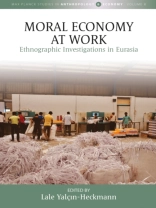The idea of a moral economy has been explored and assessed in numerous disciplines. The anthropological studies in this volume provide a new perspective to this idea by showing how the relations of workers, employees and employers, and of firms, families and households are interwoven with local notions of moralities. From concepts of individual autonomy, kinship obligations, to ways of expressing mutuality or creativity, moral values exert an unrealized influence, and these often produce more consent than resistance or outrage.
Daftar Isi
List of Figures
Introduction: Moral Economy at Work
Lale Yalçın-Heckmann
Chapter 1. Freedom and Control: Analysing the Values of Niche Business Owners in Aarhus, Denmark
Anne-Erita G. Berta
Chapter 2. The ‘Good’ Employer: Mutual Expectations amidst Changing Employment Situations in Pathein, Myanmar
Laura Hornig
Chapter 3. Moral Economy and Mutuality at Work: Labour Practices in Tobacco Shops
Luca Szücs
Chapter 4. Tenacious Ties: The Embedded Trajectory of Small-Scale Enterprises in Provincial India
Sudeshna Chaki
Chapter 5. The Morality of Relatedness in Medium-Sized Businesses in Central Anatolia
Ceren Deniz
Chapter 6. Post-Soviet Garment Manufacturing in the Era of Global Competition: Between Precarity, Creative Work and Developmental Hopes
Daria Tereshina
Chapter 7. FIAT Automobiles Serbia: The Split Moral Economy of Public-Private Partnerships
Ivan Rajković
Chapter 8. Changing Mutuality: Building a House with Unpaid Labour in Bulgaria
Detelina Tocheva
Afterword: Moral Economy in Context
James G. Carrier
Index
Tentang Penulis
Lale Yalçın-Heckmann has been a senior researcher at the Max Planck Institute for Social Anthropology in Halle/Saale and teaches anthropology at the University of Pardubice, Czech Republic. She is the co-editor of Caucasus Paradigms: Anthropologies, Histories and the Making of a World Area (LIT Publishers, 2007) and author of The Return of Private Property: Rural Life after Agrarian Reform in the Republic of Azerbaijan (LIT Publishers, 2010).












